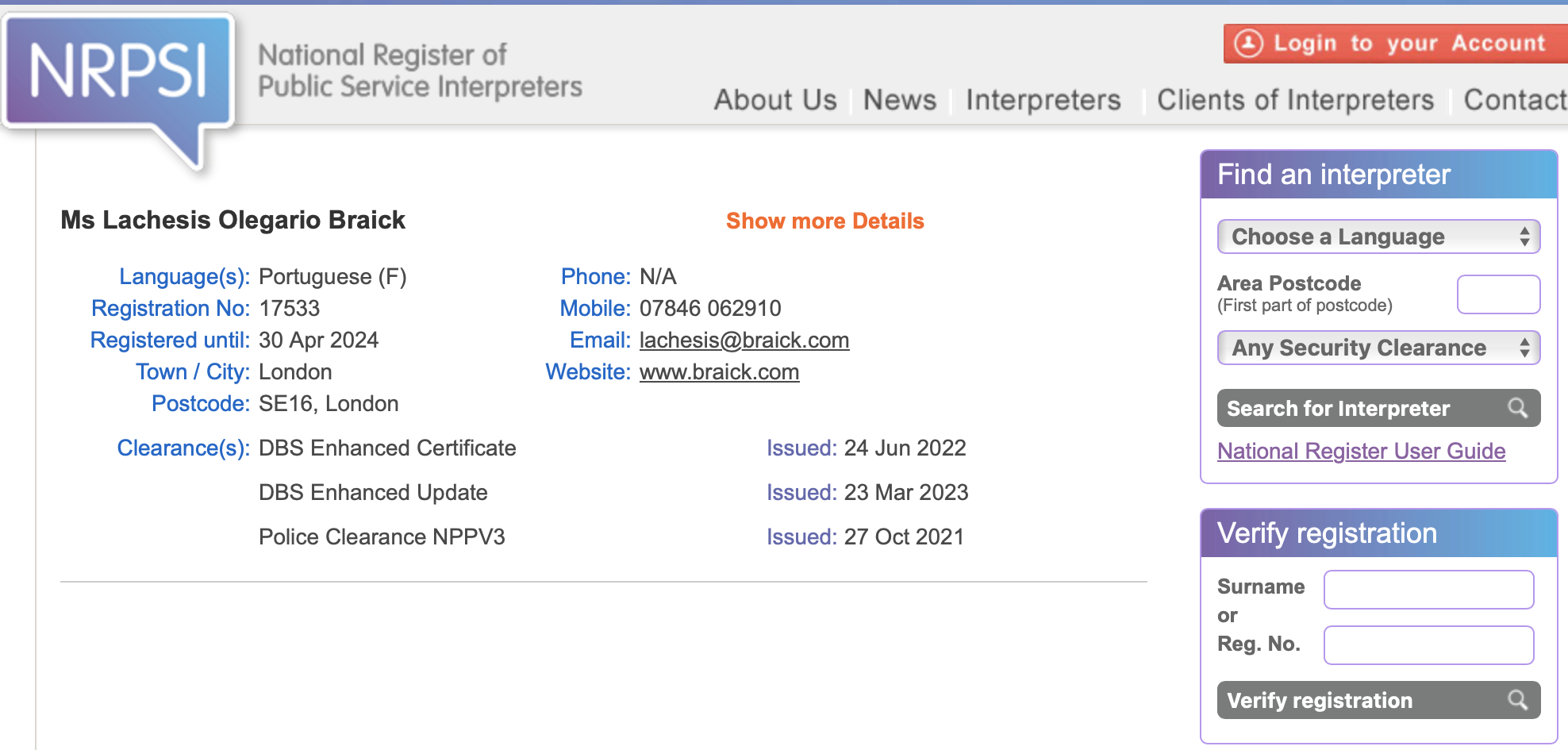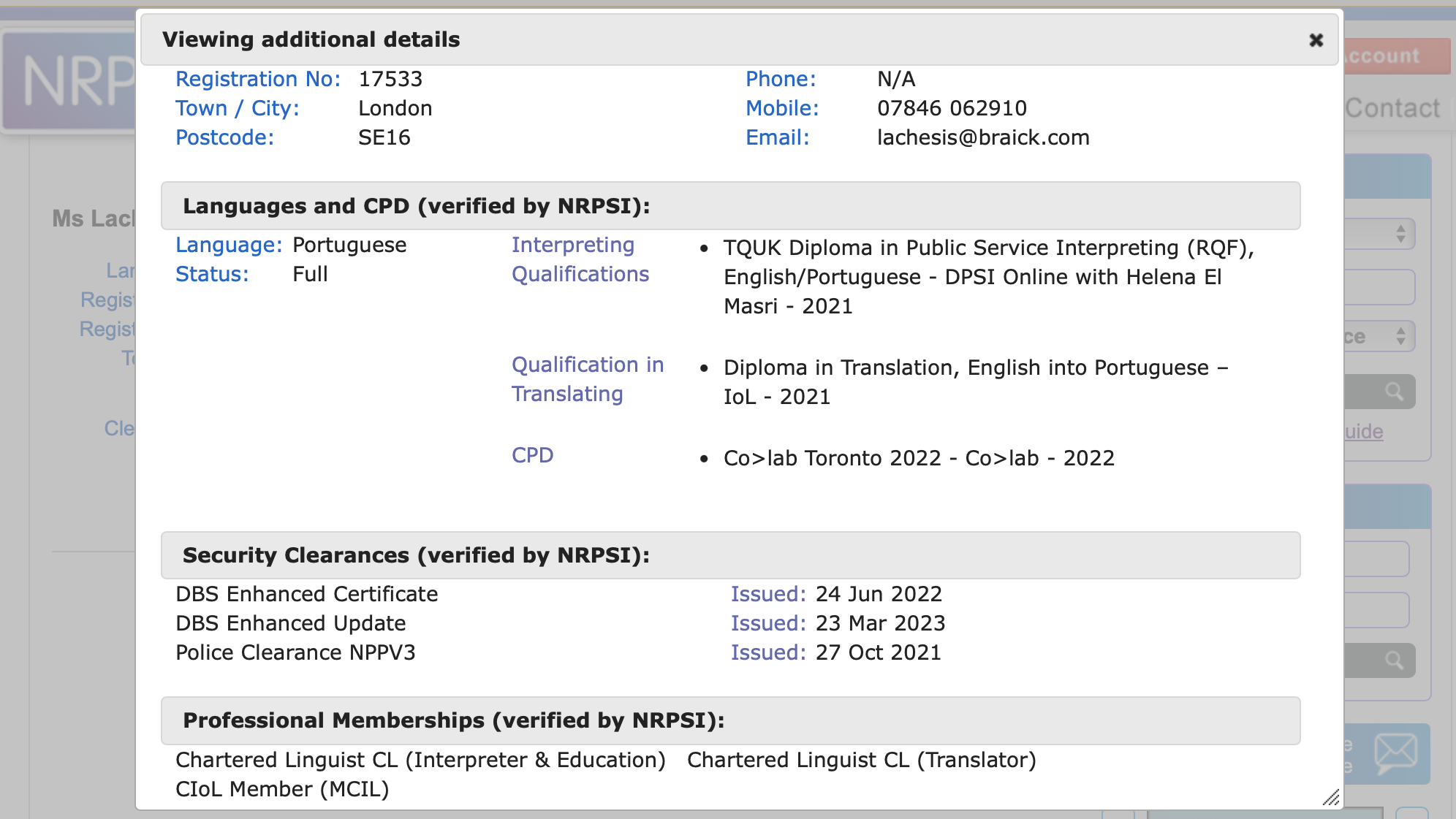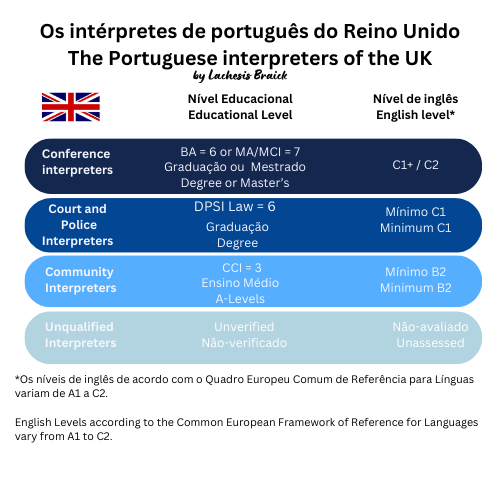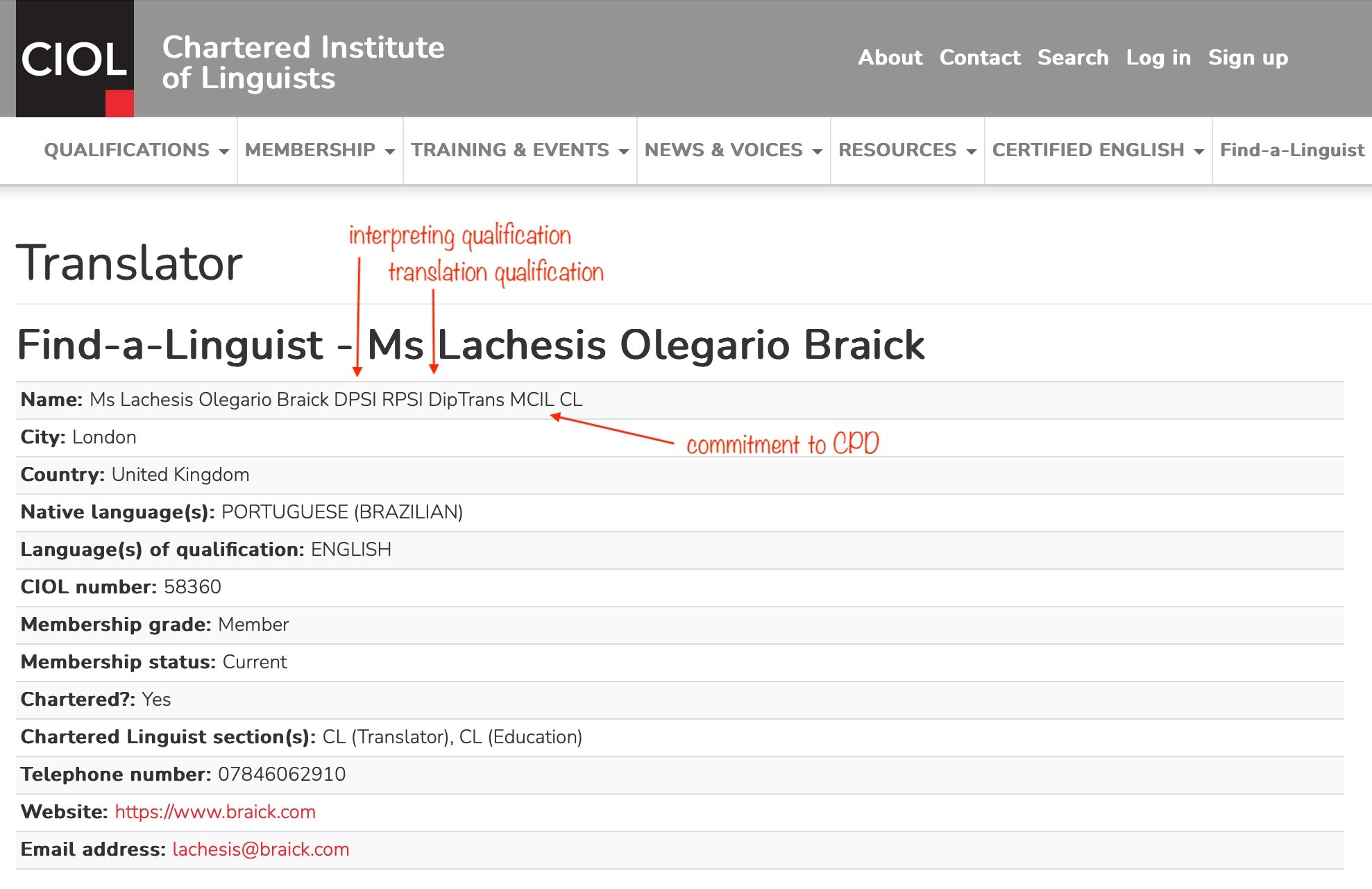The Four Different Kinds of Interpreter of the UK
(Para português, clique aqui)
Many people don't know, but not all UK interpreters are trained (and, at times, willing) to act in any thinkable context. There are differences in qualifications, experience, skills and, often, in the work they do.
Furthermore, the profession is not regulated, thus it is possible for anyone, from those with a doctorate in the field to individuals without any training, to practice the profession and use the title.
In this post, I explain a little about the four main categories and the differences between them.
Other languages may have a different dynamics
Conference interpreters
Conference interpreters are, as a rule, the most qualified. In general, these professionals have C1+ or (more typically) C2 level of English according to the Common European Reference for Languages, and a degree (or equivalent training) in interpreting or another area. They often also hold a master's degree in conference interpretation, MA (Master of Arts)/MCI (Master In Conference Interpreting).
Conference Interpreters are prepared to deal with any contexts and types of interpretation with discretion and professionalism. In other words, there is extensive training to offer simultaneous, consecutive and whispered interpretation, being able to accompany people in small meetings, technical visits, events, etc. There is also an entire framework of general culture in various areas and techniques that need to be trained and reviewed constantly to stay up to date.
Furthermore, conference interpreters navigate topics of varying complexity, ranging from extremely difficult topics such as politics, science, engineering, law and medicine (without necessarily having a degree in such areas), in contexts of communication between experts, as well as simpler and more complex topics. It is common to study for days before an assignment, in order to be prepared to deal with complicated themes. This requires a very solid level of English, so often these interpreters come from a bilingual background with an academic component.
For assignments requiring greater technical complexity, involving high value, or even that demand the use of equipment, for example, the ideal is to hire someone in this category. Lectures, business meetings and events are some of the ideal contexts.
Conference interpreters classify their languages with an ABC system:
A is the language in which the interpreter has the greatest skill, and can function as both the source and target language; it is usually one’s native language and always the most academic one.
B is a language that can be the source or target language with respect to a language A. The interpretation from B to A is called a retour.
C is the language from which the professional interprets only into language A.
Interpreters who have a C1 level of English (the second highest according to the Common European Framework Reference for languages) may only interpret into their A language. The requirement for linguistic competence is very high.
Police and Court Interpreters
The qualification to work for the police and the courts is currently the same: the DPSI (Diploma in Public Service Interpreting) Law. This is a level 6 title (equivalent to a degree), which is obtained after the candidate takes an exam that proves that the person can interpret consecutively and simultaneously, perform sight-translation of simple documents and translate Portuguese <> English in typical public service legal contexts.
The career focus here is mainly on the legal systems of the British and the other language country(its) and the objective is for the professional to be able to help the immigrant community who do not speak English to navigate the British Judiciary, police stations, courts, immigration and others. In other words, interpreters who work in this category are, as a rule, prepared to deal with legal topics that involve low to medium level of academic complexity.
Communication here is mainly focused between specialist and lay people, so the level of complexity is usually lower and less academic than that of conferences. Therefore, someone with a C1 level of English can perform the job very competently. However, for some legal topics where everyone involved is an expert, such as arbitration between companies, for example, it is more appropriate to use conference interpreters. This is because conference interpreters are typically more well versed in communication between experts and in delving into areas outside their expertise.
Interpreters who work exclusively in such contexts are generally able to deal with non-legal topics of varying complexity. However, they may have difficulties with modes such as consecutive lectures with long speeches, as well as with simultaneous/whispered interpretation if the topic is too technical and not necessarily legal, because their training and experience is focused on specific contexts where there is greater control over who speaks, how and when. This is not a rule: there are many interpreters who work with courts, police and conferences.
A large proportion of interpreters in these careers have C1 level of English (the second highest). As they are trained for specific contexts, this does not affect the quality of interpretation. There is a lot of specific vocabulary training in the area of law focused on public services, including writing and reading.
Community interpreters
This type of interpreter typically holds the lowest level of qualification: the CIC (Community Interpreting Certificate), which is level is 3, that is, less than a degree and the equivalent to high school. They may hold higher qualifications, but as remuneration is currently quite low, most of them don’t. Therefore, community interpreters are mostly not required to have a level of English that is academic.
Such professionals are prepared to accompany people who do not speak English in different contexts of the NHS (the British National Health Service), and are trained to deal with language spoken only in consecutive short speeches (usually sentence by sentence). In other words, the training received does not involve whispered/simultaneous interpretation, or the use of equipment or contexts such as events, business meetings and lectures, or legal topics.
The definition of the level of English required is vague; it is described as “high level”. As a teacher and according to my experience with interpreters, this level would be B2 of the CEFR (Common European Framework of Reference for Languages). It is a level at which the language user communicates independently, but may have difficulties with more complex or academic topics and also with certain dialects. The training itself does not focus on reading or writing texts in English. The main hurdle to many community interpreters moving to level 6 is precisely the lack of English skills that would allow them to sit more demanding exams.
Unqualified interpreters
Unfortunately, because the profession is not regulated, there are people in the UK who have no qualifications and still work as interpreters simply because they are bilingual. Since they are not assessed or trained, these professionals often are below a CEFR B2 level of English. These are people who often interpret as an extra, to supplement their income.
It is not impossible to find someone who is fully capable of performing the role with quality, but, as a rule, someone at this level will probably have a gap when it comes to understanding the rules of interpretation, using strategies and dealing with the situations themselves. It is common for untrained interpreters to make errors in English, interpretation and professional etiquette that can harm the client.
Clients are often ill-equipped to assess an interpreter’s level of skill, especially if the professional is working mostly into the language the client does not speak so many problems can arise from this.
Agencies
If you are going to use an agency, tread carefully as not everything you read on their websites may be accurate. Unfortunately, because interpreting is an unregulated profession, some of them (not all!) do not focus the quality of the interpreters they supply nearly as much as they should. A few of them (especially the biggest ones) may choose to supply the cheapest available option and sometimes will not employ a single linguist in their staff.
There have been several cases in the media recently of clients complaining about this sort of practice. In fact, Lost in Translation tells a very sad tale of agencies unfortunately providing unqualified interpreters for jobs where people’s health and access to justice was at stake. Their justification is usually lack of qualified intepreters, but the main issue is the fees some of them are willing to pay.
If you hire interpreters through an agency, it is prudent to specify what level of qualification you want. Additionally, requiring the interpreter to be professionally accredited by a regulatory body is a must.
How to know make sure an interpreter is qualified
In the UK, becoming a member of a professional organization of interpreters and translators is not compulsory and, as expected, carries an annual cost. In other words, as a rule, anyone who joins a regulatory body earns sufficient income from interpretation to compensate and justify paying the annual fee. It's an investment.
Therefore, the vast majority of members of professional organizations work full-time in interpretation. In addition, there is a requirement to provide evidence of experience and qualifications, information that can be consulted online by clients.
This can be accessed on websites such as the following:
Chartered Institute Of Linguists
This institute includes interpreters with experience in the private and public sectors. Any full member will hold a read qualification and a certain number of years of professional experience and will also have provided references.
MCIL means someone is a full member, i.e., they have a relevant qualication plus at least 3 years of experience and references
DPSI is a level 6 qualification in legal interpreting
Diptrans is a level 7 qualification in translation
CL (Chartered Linguist) means this person is committed to CPD.
National Register of Public Service Interpreters:
This register includes all interpreters with experience in the public sector. Any full member will have completed at least 400 hours of interpreting and holds qualifications. To maintain the status one has to complete a certain number of assignments every year. Their website also provides the interpreters’ rough location and a description of their qualifications and further training they have undertaken.







